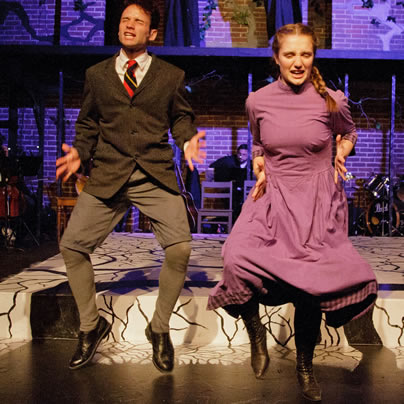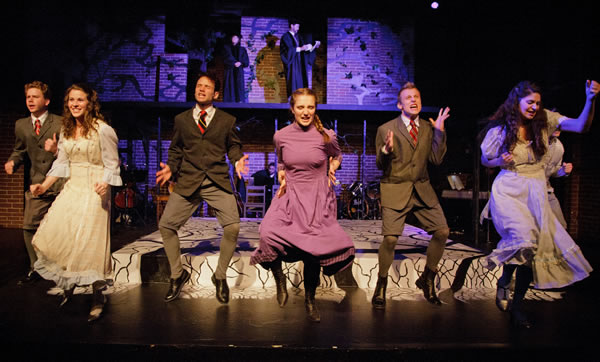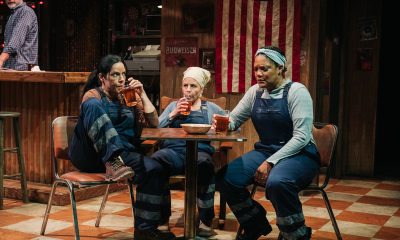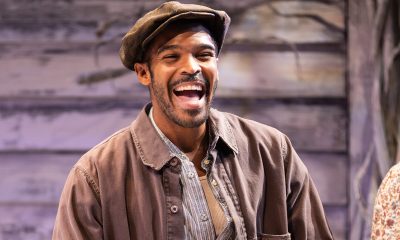Arts & Entertainment
Heat of the moment
Heady ‘Awakening’ explores teen lust in coming-of-age hit musical

‘Spring Awakening’
Keegan Theatre
Church Street Theatre
1742 Church Street, NW
Through July 8
$40, $35 students/seniors

The cast of Keegan Theatre’s production of ‘Spring Awakening.’ (Photo by C. Stanley Photography; courtesy Keegan)
Surprisingly, it’s a plaintive ballad that haunts both acts of “Spring Awakening,” the explosive trail-breaking rock musical now onstage in an excellent production by the Keegan Theatre. “The Word of Your Body” is sung by two pairs of young lovers who are about to dive into the dangerous and mysterious world of sex. With a fascinating blend of naiveté and awareness, they sing, “O, I’m gonna be wounded. O, I’m gonna be your wound.”
In Act One, it’s sung by Melchior and Wendla; in Act Two it’s sung by Hanschen and Ernst. In an unusual twist, it’s the straight couple and not the gay couple who come to a tragic end.
“Spring Awakening” is based on a controversial play by the remarkable German playwright Frank Wedekind. Although written in 1891, the play was not performed until 1906 and has since had a long history of censorship as it deals frankly with complex issues of sexual and intellectual awakening, adolescent rebellion, sadomasochism, political and intellectual repression, suicide, abortion, sexual abuse, gender and homosexuality.
The plot centers on Melchior Gabor (Vincent Kempski), a charismatic and intelligent teen rebel, his innocent but curious girlfriend Wendla (Ali Hoxie) and his tormented best friend Mortiz Steifel (Paul Scanlan). While Melchior and his classmates (including Hanschen and Ernst) deal with oppressive schoolmasters and uncontrolled sexual yearnings, Wendla and her friends deal with parental abuse and neglect.
Indie musicians Steven Sater (book and lyrics) and Duncan Sheik (music) have turned this 1891 German drama into a contemporary rock musical with exceptional ingenuity and creativity. Sheik and Sater wisely keep most of the plot intact and keep the action in its original time period. However, as the teenagers express their inner feelings, their inner rock stars erupt, electric guitars serving as a timeless expression of teen angst. The concept works really well and the show deservedly swept the 2007 Tony Awards.
Directors Mark A. Rhea and Susan Marie Rhea handle this challenging material with great finesses and sensitivity, guiding the talented cast through their scenes with an effective blend of comedy and tragedy. The musical staging is generally fluid and eye-catching as the cast moves from the relative still of the book scenes to the explosive outbursts of the songs. Musical Director Jake Null gets great instrumental performances from a superb 10-piece band and outstanding vocal performances from powerhouse singers with exceptional range and diction.
The cast is uniformly strong, with outstanding performances from Nora Palka as Ilsa and Charlotte Akin as the Adult Women. Palka’s rich voice brings great poignancy to songs where she tells about horrible sexual abuse (“The Dark I Know Well”) and where she tries to save the suicidal Moritz (“Blue Wind”), but she also shines when she leads the cast in the moving finale (“The Song of Purple Summer”). Akin is delightful in several small roles, showing great comic flair as a busty piano teacher and a mean schoolmistress, severe earnestness as Wendla’s mother and deeply moving sensitivity as Melchior’s sympathetic mother.
There are, unfortunately, a few missteps (quite literally) in this otherwise fine production. The choreography by Kurt Boehm sometimes undermines the delicate balance between the period setting and the contemporary rock score; fluttery hand gestures, cartwheels and moves from Michael Jackson videos feel out of place. The direction of the three-member ensemble is also rather awkward. The switch from teenagers to angels of death clutters the final scene and their costuming and blocking is frequently distracting.
While most cultural venues have already slipped into more escapist summer fare, Keegan Theatre deserves a round of applause for ending their season with more challenging material. LGBT audiences will find “Spring Awakening,” with its positive portrayal of homosexuality and complex depictions of sexual politics, especially rewarding.
Arts & Entertainment
Win a pair of tickets to Grace Jones & Janelle Monáe @ The Anthem on June 5, 2025!


The Cherry Weekend main event party was “Fire” at Betty (1235 W Street, N.E.) on Saturday, April 12. Detox of “RuPaul’s Drag Race” met with fans.
(Washington Blade photos by Michael Key)















‘Uncle Vanya’
Through April 20
Shakespeare Theatre Company
Harman Hall
610 F St., N.W.
Shakespearetheatre.org
Shakespeare Theatre Company’s “Uncle Vanya” freshly rendered by director Simon Godwin and starring Hugh Bonneville in the title role, puts a pleasing twist on Chekhov’s tragicomic classic.
As disheveled, disheartened, and overworked Vanya, Bonneville is terrific. Though very different from the actor’s fame making role as Downton Abbey’s Lord Grantham, a proud, fastidiously turned-out aristocrat who presides over a manicured country estate peopled by a large staff, his Vanya is equally compelling
For “Uncle Vanya,” Chekhov imagines a house on a ragged estate in the Russian forest whose inhabitants display varying degrees of discontent brought on by the realization that they’re leading wasted lives. Middle-aged Vanya’s dissatisfaction and disappointment have been tempered by years of hard work. But all of that is about to be challenged.
With his plain and steadfast niece Sonya (Melanie Field), Vanya keeps the place going. And while barely putting aside a kopek for himself, he’s ensured that proceeds have gone to Sonya’s father Alexandre, a querulous academic (Tom Nelis), and his alluring, much younger second wife Yelena (Ito Aghayere) who live in the city.
When called to retire, the self-important professor and his wife economize by joining the family in the country. Overcome by the intense boredom brought on by provincial isolation, they’re not happy. Turns out, life in the sticks isn’t for them.
At the same time, the urban couple’s presence generates quite an effect on the rural household, changing the mood from one of regular work to idleness. What’s more, Vanya and family friend Mikhaíl Ástrov (John Benjamin Hickey), an unusually eco-aware, country doctor, are both bewitched by Yelena.
Meanwhile, young Sonya, who’s long carried an unrequited torch for Ástrov grows increasingly smitten. And while Yelena, who’s bored with her aging husband, expresses teasing tenderness with Vanya, she feels something more serious for Ástrov. It’s a whole lot for one house.
Superbly staged by Simon Godwin, STC’s artistic director, and performed by a topnotch cast, the very human production begins on an unfinished stage cluttered with costume racks and assorted props, all assembled by crew in black and actors in street clothes. We first see them arranging pillows and rugs for an outside scene. Throughout the play, the actors continue to assist with set changes accompanied by an underscore of melancholic cello strings.
With each subsequent scene, the work moves deeper into Chekhov’s late 19th century Russian world from the kitchen to the drawing room thanks in part to scenic designer Robert Brill’s subtle sets and Susan Hilferty and Heather C. Freedman’s period costumes as well as Jen Schriever’s emotive lighting design.
In moments of stillness, the set with its painterly muted tones and spare furnishings is a domestic interior from a moment in time. It’s really something.
Adapted by contemporary Irish playwright Conor McPherson, the work is infused with mordant wit, ribald comedy, and sadness. Like McPherson’s 2006 play “The Seafarer” in which the action unfolds among family, friends and others in a modest house filled with confrontation, laughter, resentment, and sadness. All on brand.
For much of “Uncle Vanya,” McPherson’s script leans into humor, funny slights, the professor’s pretentions, and Vanya’s delicious snarky asides; but after the interval, the play’s stakes become perilously heightened ready to explode with resentment and feelings of wasted potential, particularly frustrations expressed by Vanya and his intelligent but unfulfilled mother (Sharon Lockwood).
When it appears that mismatched couple Alexandre and Yelena are poised to depart, the house is struck with a sense of both relief and gloom.
Not everyone is disturbed. In fact, the family’s old nanny Nana (Nancy Robinette), and Waffles (Craig Wallace), a former landowner and now lodger on the estate, are elated. Both are eager to return to the pre-professor schedule of an early breakfast and midday lunch, and menus featuring simpler fare. They long for the return of the humble Russian noodle.
“Uncle Vanya”melds cynicism and hope. Like life, it’s a grasp at fulfillment.
-

 District of Columbia5 days ago
District of Columbia5 days agoWorldPride organizers may warn trans people from abroad not to attend event
-

 Opinions4 days ago
Opinions4 days agoIt’s time for new leadership on the Maryland LGBTQIA+ Commission
-

 The White House4 days ago
The White House4 days agoWhite House does not ‘respond’ to reporters’ requests with pronouns included
-

 Noticias en Español4 days ago
Noticias en Español4 days agoINDIGNACIÓN: ¡El transfeminicidio de Sara Millerey en Colombia nos cuestiona como sociedad!












